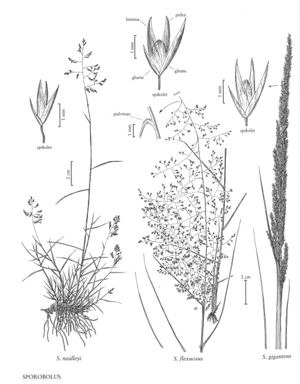Difference between revisions of "Sporobolus flexuosus"
FNA>Volume Importer |
FNA>Volume Importer |
(No difference)
| |
Revision as of 21:32, 16 December 2019
Plants perennial (rarely appearing annual); cespitose, not rhizomatous, bases not hard and knotty. Culms 30-100(120) cm tall, 1-3 mm thick near the base, erect to decumbent. Sheaths rounded below, smooth or scabridulous, margins some¬times ciliate distally, apices with tufts of hairs, hairs to 4 mm; ligules 0.5-1 mm; blades (2)5-24 cm long, 2-4(6) mm wide, ascending or strongly divergent, flat to involute, glabrous abaxially, scabridulous adaxially, margins scabridulous. Panicles 10-30 cm long, 4-12 cm wide, longer than wide, open, subovate to oblong; rachises drooping or nodding; lower nodes with 1-2 branches; primary branches 1-8(12) cm, flexible, diverging at least 70° from the rachis, often strongly reflexed to 130°, tangled with each other and with branches from adjacent panicles; lower branches no longer than those in the middle, usually included in the uppermost sheath; secondary branches widely spreading, without spikelets on the lower 1/8 – 1/2; pulvini pubescent; pedicels 0.3-3 mm, spreading, scabridulous. Spikelets 1.8-2.5 mm, plumbeous. Glumes unequal, ovate, membranous; lower glumes 0.9-1.5 mm; upper glumes 1.4-2.5 mm, subequal to the florets; lemmas 1.4-2.5 mm, lanceolate to ovate, membranous, glabrous, acute; paleas 1.4-2.4 mm, ovate, membranous; anthers 0.4-0.7 mm, yellow. Fruits 0.6-1 mm, ellipsoid, light brownish to reddish-orange. 2n = 36, 38.
Distribution
Colo., N.Mex., Tex., Utah, Calif., Kans., Mont., Ariz., Nev.
Discussion
Sporobolus flexuosus grows on sandy to gravelly slopes, flats, and roadsides in the southwestern United States and northern Mexico. It is associated with desert scrub, pinyon-juniper woodlands, and yellow pine forests. Its elevational range is 800-2100 m.
Selected References
None.
